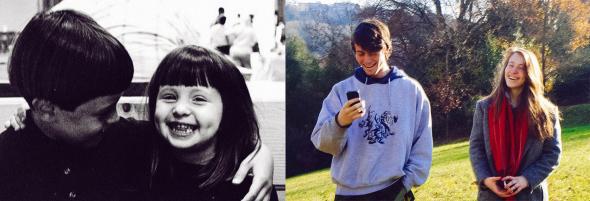Can Widows Add Their Maidan Name To The Married
What'south in a Name?
I agonized over irresolute mine when I got married. Then I lost my husband.

Lisa Larson-Walker
It is fall in New York, and I am at City Hall with my soon-to-be husband applying for a marriage license. Our son, just a week old, is a sleepy little dumpling bundled against my chest. His heartbeat is pocket-size and steady, his breath shallow and warm and sweet against my body. For 9 months he was a part of me, and at present that he is actually here, I can't quite process the thought of any concrete distance between us. Even putting him in a stroller seems wrong, like an unthinkable migration to a reality that I'thou nonetheless struggling to comprehend—an out-of-body experience, I retrieve, every bit I juggle child and baby bag and papers. The concept of multitasking all of a sudden seems as foreign to me as space travel.
A clerk pushes a slice of paper toward me, a boilerplate course requesting all the data points that circumscribe my beingness—commuter'southward license numbers, Social Security numbers—a litany of official metrics that frame my formal identity, which, up until a calendar week agone, seemed fairly straightforward, except that now there is this other person who is part of me, merely of form he isn't, and I am suddenly thrust into an emotional seismic sea wave of existential doubt nigh biology and identity and selfhood, wondering where I end and where my kid begins.
I stare at the grade. There's a box for my maiden proper noun, and beside it, another box for my married name. And just like that, I am forced to cull. How can I have a proper noun that differs from my child's proper name? The concept of my husband and child sharing a proper noun that excludes me strikes me equally a violation of something securely primal (newly-minted motherhood makes me ferocious on this topic), merely letting get of my own name seems as if non more vexing. There is no correct answer, and I freeze. I am hormonal and slumber-deprived and incapable of thinking clearly: non of my own personhood or ego, not about the difficult-won victories of my feminist forebears, not nearly the thorny repercussions of an antediluvian marital custom, not even virtually the potential consequences of divesting myself of my own pre-existing personal and professional ambitions.

Jessica Helfand
I adjust my infant son in his tiny sling. He burps. I cave.
And I hyphenate.
For the side by side 2 decades, I live with a name that does not fit on a credit card. It is confusing and mercurial, sometimes unsettling, ever slow. Misspellings are my new normal, with egregious consequences (banking woes, billing errors) at once aggravating and all likewise frequent. Over time, I acquire to compartmentalize. In my studio and with my students, I am maiden-name me. With the electrician and with the pediatrician, I am married-name me. The hyphenated mashup is restricted to only the virtually official of documents—my passport, my driver's license—and I routinely hope that I am not obliged to remember in which particular circumstance I used which version, or worse, that I volition be expected to spell things out on the telephone to customer service personnel. But I persevere, and gradually, it gets easier.
My married man and I settle into married life and move to the country where we welcome a girl. There are four of us at present, a solid unit of measurement: balanced and grounded, two parents, 2 offspring. When we travel we maneuver as a team, bound past the oddly conventional withal curiously reassuring nomenclature of our mutual surname. There are, I soon find, considerable advantages to sharing a tribal affiliation that's authorized by law. I'm pleasantly surprised by the comfort of it: a kind of proof of our united front. I begin to see my married name as keenly adjudicated, evidence not then much of a submerged identity every bit a deliberate gesture that expresses itself through solidarity with my kids—who are, after all, my posse of option.
And with that posse nosotros begin years of travel: through Europe, across India, into Asia and Africa. The children grow. The dog has puppies. Life is good.
And then, all at in one case, time stands however.
Walking in the garden on an unusually warm morning in June, my married man collapses. For 15 seconds he lies motionless on the ground. I shout his name—a single syllable—and he jolts awake, dislocated but cogent. Later, he laughs about it. The children express mirth nearly it, too, merely I am non laughing, and three weeks afterwards, nosotros receive an unthinkable diagnosis. Another tsunami of emotions, only this time, I am no longer in the throes of newlywed bliss, bewitched past the mesmerizing joys of a sleeping infant, or faced with the comparatively harmless challenge of filling out a government form, because life—and death, as I soon come up to realize—does not afford me such unproblematic courtesies.

Jessica Helfand
In the hospital, I am my spouse's advocate. To our friends and family, I am his partner. To the banks and the attorney, the hospice nurses, the probate court, and to the almost comically obsequious funeral director, I am his authorized representative. I am his designated driver, his tireless protector, his main caregiver and proxy in all things and throughout it all, each of my names is invoked interchangeably as I manage bills, shuttle pills, volley calls, and transmit information. After his death, I inherit the work of both of united states of america: selling our business firm, sorting our finances, running our businesses, and standing the piece of work of raising our children who are blossoming alpine, potent, and contained, with voices and visions of their own, futures to build with their own partners, decisions to brand, lives to pb, and names to change just if they choose to do so.
I changed mine once, and the fourth dimension has come up to alter it dorsum again.
* * *
Contrary-engineering your identity turns out non to be such an piece of cake thing to do. At that place are legal forms to locate and sign, Social Security documents to notarize, a birth document to discover and costs at every stage of the procedure. Although I consider myself adequately well-educated, information technology takes me hours of research and multiple calls to my lawyer to even brainstorm to assess how this is done. I feel similar I am divorcing myself, and I wonder why I did all of this in the first place. Only I am committed to simplifying everything now, and restoring my nonhyphenated proper name feels at once overdue and necessary.
Is it possible that naming things is role of my Dna? When I graduated from college, I worked briefly as a soap-opera author; my favorite task was naming villains, which I did by matching them to the names of my ex-boyfriends. In our studio and in our family, I have since been responsible for naming everything from children to projects to pets—the last a category that affords me both great personal pleasure and considerable artistic latitude. (I once named a hermit crab Kafka because he was, after all, a crab.)
As a kid, I loathed my first name, wishing with all my center that my parents had called instead to call me Francine. When I was most 8 years erstwhile, I earnestly lobbied for a name change with my father, approaching him with cautious optimism 1 day to ask if he'd always wanted to alter his own proper name, and if and then, to what? ("All the time," he replied without hesitation. "To Rockefeller.") As a marketing executive at Merck in the pre-digital 1960s, he'd been responsible for coming upwardly with drug names, which he did by generating yards of reckoner printouts wherein chemical compounds were matched with words that loosely referenced their pharmacological purpose. My wordsmith mother, equally information technology happened, was an ace at this do: She once proposed Auntie Em for a pediatric anti-emetic (or anti-nausea) drug. She'd married my father a decade earlier and changed her own proper name instantly. My older sister would later merchandise in our family unit name upon reciting her vows, too.

Jessica Helfand
Marriage invites u.s.a. to reframe our coordinates. We seek licenses, join registries, crave progeny and property—cocky-identifying past virtue of our connectedness to others, like information technology'south a game, and we're playing to win. We're proud of these connections, persisting in the imitation hope that they're as eternal every bit the vows we once clung to. I remember of 17 years that came and went in a nanosecond—a baby, a spousal relationship, a family. Another babe. A business firm and a domestic dog. Many dogs. Many trips. Many changes. Maybe besides many.
All of u.s. hold surnames, just in the terminate, they're little more than fleeting totems of identification, perhaps more migratory than meaningful, uncoupled to who and what we actually are. The infant I once wore is in college now. Both he and his sis will vote in the coming election. Their resilience remains a beacon of wonder to me, a testament to their independence, their spirit, their inner grace. Watching them, I'm reclaiming of a kind of centripetal force, slow and steady and stiff. Ours continues to be a series of odysseys, mercurial and mysterious, alternately joyful and painful. We are leap not and so much not by our names as by our experiences, united past beloved, non duty; past bureau, not the alphabet. Felled by loss, we spin out like tumbleweed, gathering air, irresolute shape, rebounding as nosotros go.
Read all the essays inSlate'southward Female parent's Mean solar day package.
Can Widows Add Their Maidan Name To The Married,
Source: https://slate.com/human-interest/2016/05/i-changed-my-name-when-i-got-married-i-changed-it-back-when-i-was-widowed.html
Posted by: rossoffied.blogspot.com


0 Response to "Can Widows Add Their Maidan Name To The Married"
Post a Comment